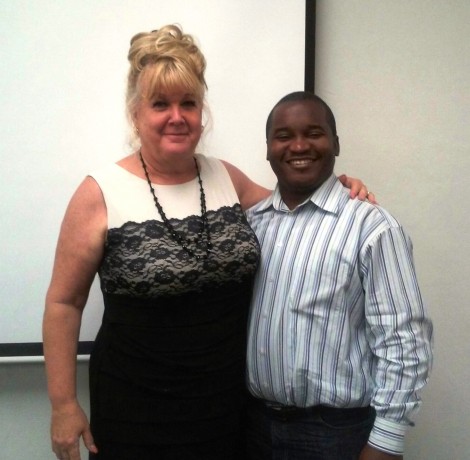One out of every three people you meet every day is obese. Obesity is a medical condition in which excess body fat has accumulated to the extent that it may have a negative effect on health, leading to reduced life expectancy and/or increased health problems (Wikipedia.org). In June this year I spent a few weeks living close to the White House, in Washington, DC. My stay there was as a result of The Road Tripping Toastmasters project I had embarked on.

During my stay in Washington, DC, I found a Higi Station at a Giant store and out of sheer curiosity, I used it. The Higi Station checks vitals like your blood pressure, heart rate, weight, and calculates your BMI (Body Mass Index). My BMI was 36.47. According to the World Health Organization, a BMI of 30 or above indicates obesity. It does not necessarily equate to health issues, but that must make you ring the alarm.
In my case, with a blood pressure at 149/91 mmHg (normal is 120/80 mmHg), I knew I had to take some action in order to get in better shape. So I did. I specifically took three steps:
- Created a support group. I informed my family members about those facts and enlisted them in a support group to help me make a positive change.
- Educated myself. I had always been aware that the food we eat has a lot to do with the quality of life we lead. However, I had somehow believed that because I was not “sick”, the food I was eating was good. Wrong! The greatest talk about food on YouTube is this one: https://www.youtube.com/watch?v=zjPFKW_MYtM
- Recommitted to my daily exercise routine. I used to walk 1 to 2 miles every day, but not always assiduously. I decided to add more intensity to my exercise, and never skip a day (easier said than done).
That was in June. We are now in November and I got new stats from the Higi Station. Here are the relevant info:
- Reduced my weight by 5 Pounds (2.26 Kg)
- Reduced my blood pressure to 131/85mmHg
- Reduced my BMI to …35.61
It might not be impressive, and could have definitely been better. However, the important thing for me is that I have a much better understanding of my health, and how what goes through my mouth impacts my body. Life is a big experiment and more often than not, you and I are being experimented on without our permission or awareness. I think we should individually be running our own experiments to identify that is best for us, rather than letting other people and corporations tell us.
If you feel or look overweight, you probably are. If you know your height and age, here is a tool to quickly calculate your ideal weight: http://www.calculator.net/ideal-weight-calculator.html. If your current weight exceeds your ideal weight, welcome to the “people who realized they are obese” club. If you want to join the “people on a journey out of obesity club,” keep reading.
What are the three lessons I have for you, you ask? Here they are:
- Don’t try to normalize your weight without having a good motive for doing so. Otherwise you will feel bad about yourself when your will is not strong enough to maintain the discipline required. My motivation to normalize my weight is the decision I made to reach my 90th birthday in great health. We cannot stop the aging process, but we can slow it down a great deal.
- Start small and give yourself at least 6 to 12 months before looking for significant changes. It is true that with workout programs like T25 and P90x, or Insanity, you can get amazing results in a very short period of time. However, if you intend to normalize your weight and keep it that way, you have to develop a new set of habits that help you maintain that discipline. If you don’t have any exercise routine, start with a daily 1 mile walk (about 17 minutes for me) and progressively increase it as the days go by.
- Make a commitment to someone you respect, and be accountable. It might be your spouse, your boss, your business partner, or even your coach (if you have one.) Being accountable helps keep you on your toes. When you know you have a report to submit and no excuse is acceptable, you get the report done (even if done poorly). Until you learn to do it well, anything worth doing is worth doing poorly.
Stay tuned for Part 2 of this series in a few months.
Till then, here are a few links to help you or someone you know tackle his or her obesity situation:
- https://higi.com/locator: To find a Higi station near your home in the U.S. and check your basic vitals.
- http://www.cdc.gov/obesity/data/adult.html: To learn about the obesity situation in the U.S.
- http://www.yamentou.com/i-failed-at-fasting-for-7-days-but/: To learn from my failed attempt at fasting to normalize my weight.